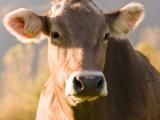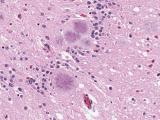May 5, 2004 (CIDRAP News) The Food and Drug Administration (FDA) said yesterday it had traced the rendered remains of a Texas cow that should have been tested last week for bovine spongiform encephalopathy (BSE) and would make sure they are not fed to cattle.
The US Department of Agriculture (USDA) disclosed May 3 that a cow at a slaughterhouse in San Angelo, Tex., last week showed possible signs of brain disease but, contrary to standard procedures, was not tested for BSE. An inspector who saw the cow stagger and fall condemned it as unfit for human consumption, and its carcass was sent to a rendering plant, the USDA said.
The FDA said in a news release that the cow had been rendered into meat and bone meal for animal feed. The agency said it would tell the rendering firm that the meal could either be used for swine feed or destroyed. FDA regulations bar the use of protein from ruminant animals (such as cattle, sheep, goats, and bison) as feed for ruminants, because the practice can spread BSE among cattle.
The agency said it learned of the case Apr 30 and immediately began investigating. Investigators learned that the cow had already been rendered into meat and bone meal, and they were able to trace all the meal over the weekend, the FDA said.
"That material is being held by the firm, which is cooperating fully with the FDA," the agency said.
Once the cow was rendered, it was too late to test for BSE, officials said. But the FDA said it was informing the rendering company that "FDA will not object to use of this material in swine feed only. If it is not used in swine feed, this material will be destroyed. Pigs have been shown not to be susceptible to BSE."
If the firm agrees to use the material for swine feed, the FDA will track it all the way to the farm to make sure it is used only in that way, the statement said.
Rendered material from pigs can be used in cattle feed if the material comes from a rendering plant that handles nothing but pigs, a spokesman at the FDA's Center for Veterinary Medicine in Rockville, Md., told CIDRAP News. "We have no evidence that pigs can acquire BSE or any similar disease through feeding practice. Therefore, feeding rendered pure porcine products to cattle is not considered to carry the risk of spreading BSE," said the spokesman, who asked that his name be withheld.
See also:
May 4 FDA news release
http://www.fda.gov/NewsEvents/Newsroom/PressAnnouncements/2004/ucm108292.htm
















